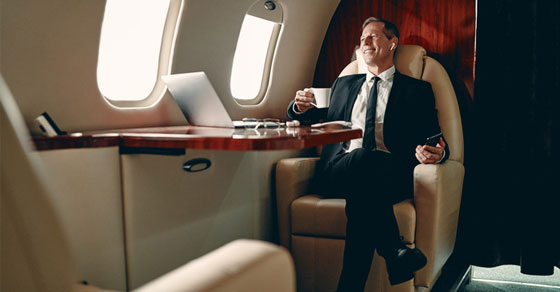The tax implications of owning a corporate aircraft

If your business is successful and you do a lot of business travel, you might consider buying a corporate aircraft. Of course, there are tax and non-tax implications for owning a corporate aircraft. Let’s look at the basic tax rules.
Business travel only
A plane purchased strictly for business use allows the company to deduct its entire cost the year it’s placed into service. The two cases in which the aircraft is ineligible for this immediate write-off are:
- The few instances in which neither the 100% bonus depreciation rules nor the Section 179 small business expensing rules apply
- When the taxpayer has elected out of 100% bonus depreciation and hasn’t made the election to apply Section 179 expensing
In those cases, the depreciation schedule is 20% of the cost for year one, 32% for year two, 19.2% for year three, 11.52% for year four, 11.52% for year five, and 5.76% for year six. Note: the bonus depreciation rate is scheduled to phase down for property placed in service after 2022.
Interestingly, these “cost recovery” rules are more favorable than the business auto rules. Business auto rules place annual caps on depreciation. Both depreciation and Section 179 expensing occur the year an auto is placed in service.
For a business-travel-only aircraft, post-acquisition expenses aren’t treated differently than post-acquisition expenditures for other machinery and equipment. For example, routine maintenance and repair expenses are immediately deductible. Meanwhile, amounts that improve or restore the aircraft must be capitalized and depreciated.
There is one “catch” distinguishing the tax treatment of an aircraft used 100% for business travel from other machinery and equipment. Company aircraft is a category of business property that requires more rigorous recordkeeping. This proves the connection of uses and expenses to business purposes.
Business and personal travel
Personal travel won’t affect the depreciation results discussed above if the value of the travel is compensation income (and is reported and withheld upon as such) to a person that isn’t at least a 5% owner or a person “related” to the corporation. For example, that personal travel by a non-shareholder won’t depreciate if the travel value is compensation reported and withheld upon. Depreciation is affected if the person for whom the value of the travel is compensation income is at least a 5% shareholder or a related person. But even in that case, the depreciation results won’t be affected if you comply with a generous “fail-safe” rule.
Personal travel won’t affect the treatment of otherwise-deductible post-acquisition expenditures if the travel value is compensation income reported and withheld upon. The only limitation is if the person for whom the travel value is to be treated as compensation income is at least a 10% owner, director, officer, or a person related to the corporation. In that case, the deduction amount for otherwise-deductible costs allocable to the personal travel can’t exceed the travel value.
Owning a corporate aircraft
Other rules and limitations may apply. So, even in the case of an aircraft used for business and personal travel, these rules aren’t onerous. They require careful recordkeeping, and an aircraft used for personal travel requires compliance with reporting and withholding requirements. Contact our RRBB accountants and advisors to learn more about your situation.
© 2021
RRBB eNEWSLETTER
Get free tax planning and financial advice




